VE Day reminds woman how she almost starved to death
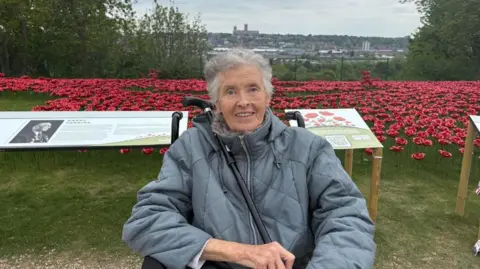 BBC / Holly Phillips
BBC / Holly PhillipsCoby van Riel was only 12 years old when World War Two came to an end. For many, VE Day is a time of celebration. But, for Coby, it's a bittersweet memory. Looking back 80 years means confronting how close she came to starving to death.
I'm sitting across from 92-year-old Coby, who's birth name is Jacoba, in a marquee outside the International Bomber Command Centre (IBCC) in Lincoln.
She's smiling warmly from her wheelchair, wrapped in a coat, clearly content from her lunch with her daughter Helga and son-in-law Douglas at the IBCC café.
Coby, who lives in Bracebridge Heath, Lincolnshire, is energetic and eager to share her story from nearly eight decades ago.
"In the early times, we had a very easy life," Coby tells me of her time growing up in The Hague in the Netherlands.
But the ease of her childhood soon vanished when German forces invaded the Netherlands on 10 May 1940.
Coby witnessed the bombing of the area and says her family was forced out of their home and into the cellar of her uncle's cafe when she was just eight years old.
She was told not to worry and they would only be living there for three months until the war was over.
That was 1942.
They lived there for three years.
"It was horrible because we had sudden flooding sometimes. We had an enormous pest of fleas. There were fleas everywhere," Coby recalls.
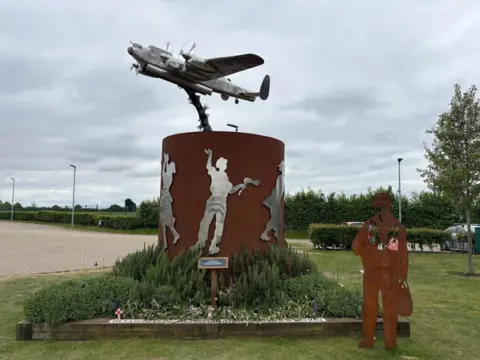 Holly Phillips/ BBC
Holly Phillips/ BBCOn top of that, Coby and her family were starving.
During what was known as the Hunger Winter at the end of 1944, the German occupation deliberately cut off food supplies to the western Netherlands during the coldest winter on record at the time.
People were so desperate, they resorted to scavenging through bins, eating tulips - half of which were poisonous - and even eating cats and dogs.
About 20,000 people died from starvation and nearly a million were classed as malnourished.
Coby would steal potatoes from a German-occupied park.
And once, driven by hunger as well as the sheer innocence and boldness of a 10-year-old, she stood face-to-face with a German soldier - a gun in his hand - and asked him for food.
The soldier went "berserk", she says.
"He said: 'If you don't go away, I'll shoot you'. Then he started to get very angry with me because I didn't stop."
Coby recalls darting away in a zigzag - running from side to side so the soldier couldn't get a clear shot, even if he tried.
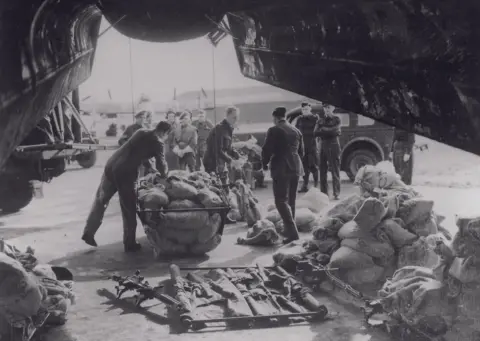 International Bomber Command Centre
International Bomber Command CentreCoby remembers her parents being told by a doctor they couldn't be helped because they were so ill and needed food - which they didn't have.
"After my parents were ill, my brother and I got very ill because we had nothing to eat."
However, Coby says her life was saved by Operation Manna.
The mission began on 29 April 1945 - nine days before the end of WW2 - when 242 Lancaster Bombers from Lincolnshire flew to drop sacks of food in the Netherlands.
It was the first airborne humanitarian relief operation in history.
On the first day, almost 535 tons of food was dropped. The total had reached nearly 7,000 tons after 10 days.
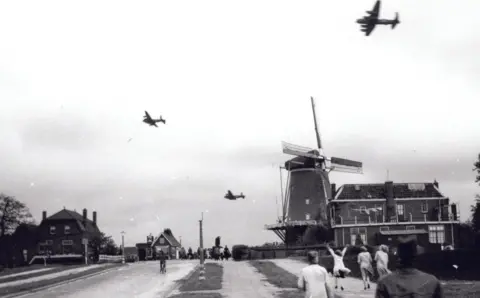 International Bomber Command Centre
International Bomber Command CentreCoby recalls the moment she saw the Lancaster Bombers overhead, describing it as "unbelievable".
"I ran outside. It was very exciting because I could, from my place, see one of the dropping places and I saw them dropping the food there. Some came down, some broke and the flour fell out," she says.
"As a child, I was so impressed. I loved it so much. I started waving - which I still do to helicopters and other planes.
"Later, I met one of the pilots who said he dropped food. I said to him I waved at you and you didn't wave back - and he burst out laughing."
Although the end of WW2 and the arrival of food brought joy to many, Coby says it was still painful.
"There were thousands of people who died - and people afterwards as well. There were still people dying.
"My parents and my brother and I nearly went, then my uncle went. I had a lot of people to thank and be pleased that the war had ended."
Nicky van der Drift, chief executive officer at the IBCC, said: "Whilst we celebrate VE Day, we must know Op Manna was being carried out over this period.
"It was an incredible mission because, not only did they have to try and organise what would be sent, how it would be sent, how it would be delivered, but also how it would be collected at the other end and distributed – and in a live war setting."
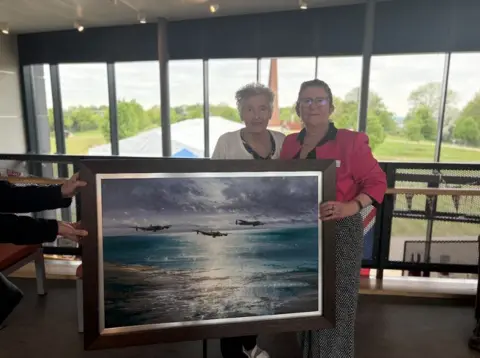 Holly Phillips/ BBC
Holly Phillips/ BBCHaving relocated to Lincolnshire years ago, Coby tells me she enjoys living in the rural county and spends a lot of her time at the IBCC.
"It connects me more with the Lancasters and, ever since I saw them [on Operation Manna], I've been crazy about not only Lancasters but anything flying, whether that was helicopters or ordinary planes," she says.
Coby will be reflecting on her memories of VE Day at the IBCC, where she will attend the centre's commemorative event with her daughter and son-in-law.
Listen to highlights from Lincolnshire on BBC Sounds, watch the latest episode of Look North or tell us about a story you think we should be covering here.
